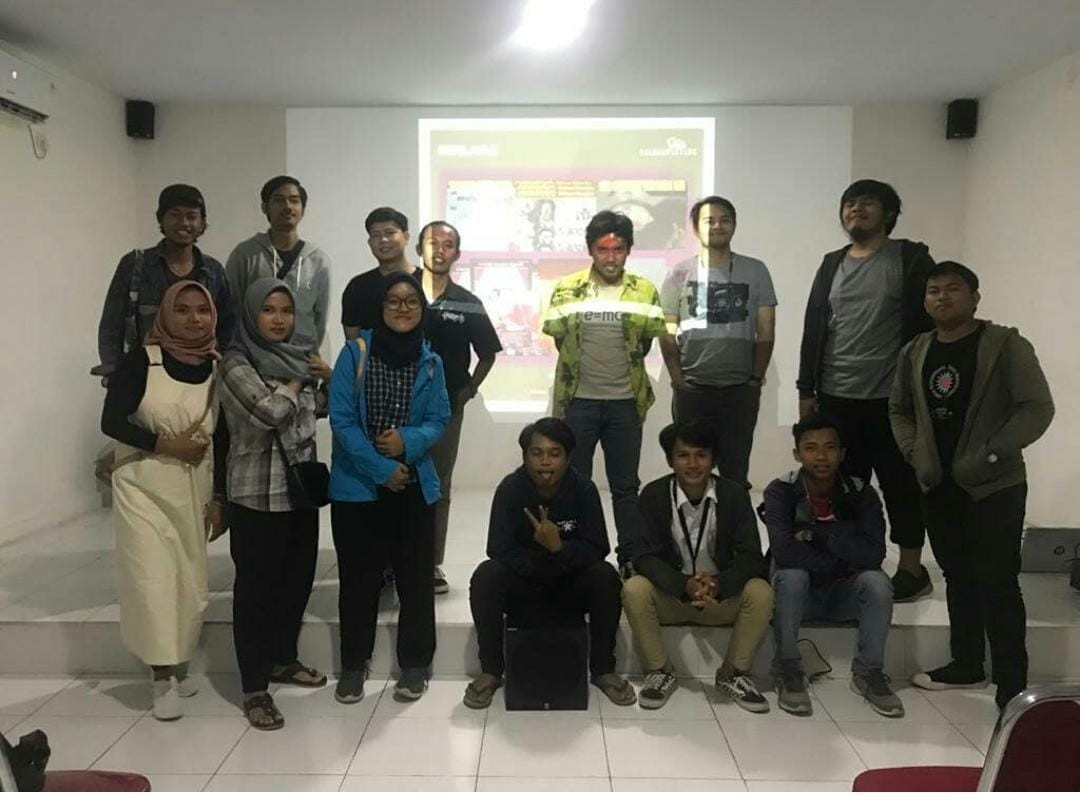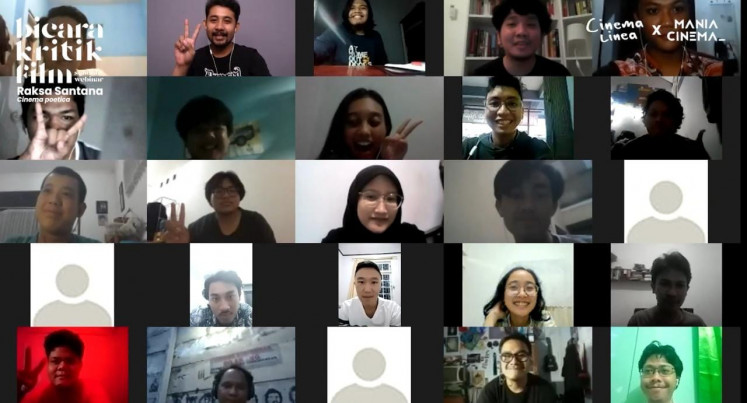Popular Reads
Top Results
Can't find what you're looking for?
View all search resultsPopular Reads
Top Results
Can't find what you're looking for?
View all search resultsHow we can do better: criticism and Indonesia’s film industry
Following the ruckus regarding musician Tompi's new film, it's clear Indonesia still has some improvement to make when it comes to understanding the critic's role in the industry.
Change text size
Gift Premium Articles
to Anyone
“How we can do better” is a new column that takes an insider’s look at various sectors and how they could improve. In this installment, we delve into film criticism in Indonesia.
“Hopefully, this talk won’t turn into something toxic and negative,” said Joko Anwar, one of Indonesia’s leading filmmakers, as he opened a discussion between filmmakers and film critics through Twitter Space, the social media’s live audio feature, on Aug. 20. That heads-up seemed necessary; there needed to be an antidote to the recent clash among filmmakers, critics and moviegoers in the country.
The clash started with the bad reception for doctor-and-musician-turned-filmmaker Tompi’s latest film, Selesai (Finished), which was panned by the general audience (its rating on the movie database site IMDb is 4.6 out of 10 stars). The public disdain was not only targeted at the film’s artistic quality but also its “sexist tone”, as one IMDb reviewer put it.
But another thing that added fuel to the fire was Tompi’s defensive statement during an Instagram Live session chatting with fans, where he claimed that “not everyone might have the knowledge to understand the film.” This indicated that he was unable to accept the argument that his film might have a sexist narrative.
Moviegoers gladly held them to account when Tompi and his screenwriter Imam Darto joined a discussion about their film on a different Twitter Space on Aug. 19 that prompted even more of a backlash.
“Look at my track record, do you not see me as someone who speaks bluntly and matter-of-factly?” Tompi said in a WhatsApp call with The Jakarta Post on Aug. 25.
Finished: Singer Tompi's film 'Selesai' (Finished) has faced criticism for what is considered its sexist content. (JP/Nedi Putra AW)“To properly criticize, one needs to have a certain scholarly knowledge,” he added, standing by his statement. “If a cinematographer criticizes my film’s cinematography, of course I’ll listen to them.”
Here is where other filmmakers chimed in and also pondered upon a similar question in Joko’s Twitter Space the very next day: How should filmmakers approach or respond to criticism?
The importance of criticism
“A critic’s roles are numerous,” senior film critic Eric Sasono told the Post on Aug. 26. “They can start from the technical aspects, like the editing and the acting, from the aesthetics, like why a film uses black and white, to discussions about ‘address’, as in what the filmmakers are trying to say, and whether it’s accurate in the context of the current situation,” he explained.
“Or [there may even be] socio-political criticism that borrows from a certain film’s narrative to open a public discussion, like talking about human rights through Korean dramas,” he said. “That’s why [criticism’s] range is almost limitless.”
Galih Pramudito, cofounder of film community and review website Mania Cinema, felt that criticism of Indonesian films is often trivialized. “It’s sad because, in reality, there’s quite a lengthy creative process that one goes through when constructing a critique of a film,” he told the Post on Aug. 27. “I wish criticism could be seen as more than just a part of a film’s marketing,” he added.
His concern is not at all baseless. In 2019, movie-review YouTube channel Cine Crib received numerous threats and even a cease-and-desist letter from production houses for giving their movies bad reviews. Their reasoning? That Cine Crib’s bad reviews harmed the Indonesian film industry.
However, the films that Cine Crib heavily criticized still raked in millions of viewers. Streaming-wise, Selesai is also profiting well and had more than 100,000 views on the Indonesian TVOD streaming service Bioskop Online, despite its negative reception.
If criticism is not the decider of whether a film succeeds at the box office or not, what, then, is its purpose?
Eric believes that, aside from being a form of appreciation and literacy, film criticism can also help the industry mature, or “an attempt to build standards for the industry,” he said on Joko’s Twitter Space. Every criticism, he said, could only come from a place of love for the country’s film industry itself, in the hope that the products can gradually be better. Even Tompi accepted this.
“For those who think that my film is terrible, set it as your minimum standard, so that when you look for or make one later, it won’t be as bad as [mine],” Tompi told the Post.
Which one is valid?
From Tompi’s reasoning about his film’s negative buzz to other Indonesian filmmakers’ own experiences receiving terrible reviews, a lot of their lamentation hinges on the so-called “democratization” of film criticism, which is the current, modern era where production, distribution and access to film criticism is easier, thanks in huge part to the internet.
“Sometimes, this democratization makes a lot of things instant,” producer Meiske Taurisia said on Joko’s Twitter Space. Even her latest festival-award-winning film, the adaptation of Eka Kurniawan’s novel Vengeance Is Mine, All Others Pay Cash, directed by Edwin, has not been exempt from bad reviews. She regrets the fact that the reviews read less like a critique and more like an “initial response.”
Room for discussion: People participate in a webinar on criticism with Raksa Santana from Indonesian online media for film studies and criticism, Cinema Poetica, on April 9. (Cinema Poetica/Courtesy of Galih Pramudito)“To write something, one needs to exercise what they are thinking in the first place, right?” she said, noting the importance of time in making criticism.
What irks Gina S. Noer, the prominent Indonesian screenwriter, is that social media often becomes a place of attention-seeking “critics”. Others agree, claiming that sometimes the virtual space is just filled with cinephiles showing off their in-depth knowledge of films; the more obscure their taste, the better.
But given the changing landscape of the film discourse, for Eric, this phenomenon will always be there, like it or not. Some strengthen their film knowledge through the internet, and some also reinforce their taste on others. “What can you do? Just leave [some of them] be,” he said on Twitter Space.
Joko agreed, while hoping that there would be growth in the ways of expression. “Right now, [the film discourse scene on social media] may be a bit noisy, but I believe it will turn out for the better,” he said during the Twitter Space session.
New attitudes on both sides
The whole essence of Joko’s Twitter Space, then, is to underline that both Indonesian film critics and filmmakers are two sides of the same coin, hence the need for them to be more understanding of each other.
“A critic is someone who starts a dialogue, not someone who gatekeeps,” film catalogue editor Lisabona Rahman said on Twitter Space. And in terms of an ethical debate that might rise like in the discussions about Tilik and Selesai, she said critics “also need to have manners and be willing to start a discussion toward that ethical territory.”
Meanwhile, filmmakers need “to be more selective in choosing what reviews to process,” actor and filmmaker Paul Agusta said. “Looking for a critic to hold on to is like looking for your life partner,” he said.
But this does not mean filmmakers can disregard what the audience thinks of their work. “I think it’s important to see that film enthusiasts on social media are not just consumers; they have the potential to become masses who can criticize and maintain the film ecosystem,” Alya Cholid, a well-known film student and filmmaker in the community, told the Post.
Alya believed that the reception of Tompi’s film only showcased what has always been in the film community. “In my opinion, the realm of film criticism on social media has not changed in terms of audiences being critical of the issues presented in the film,” she said.
“People have also begun to have awareness and care about the feminist discourse thanks to the film industry,” she said, noting that campaigns such as #SinemaGakHarusToxic (cinema does not need to be toxic) was created to fight against sexual harassment in the film community, or that the Association of Indonesian Film Scholars (KAFEIN) conducted research last year that showed that the Indonesian film industry has not been gender-friendly.
Eventually, the more conversations and discourses that arise, the more people will be curious and intrigued to know about the matter and the film itself.
English literature major Shinta Aprilia, 22, who does not really follow Indonesian film releases, tunes into what is being talked about on social media to decide what to watch.
“I can be considered as someone who watches something that I know I won’t like,” she confessed.
“So, if there is a heated argument surrounding a movie, then I’ll watch it. But it also depends on how the discourse goes, is the film worth my time to insult or praise it?” she added, proving that the viewer is always an active assessor of a film.













